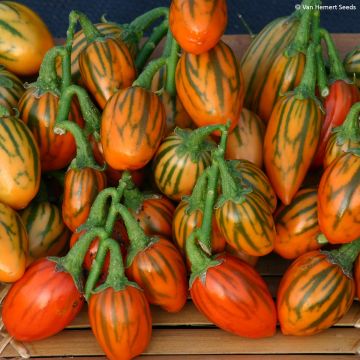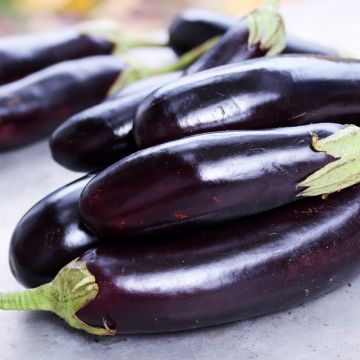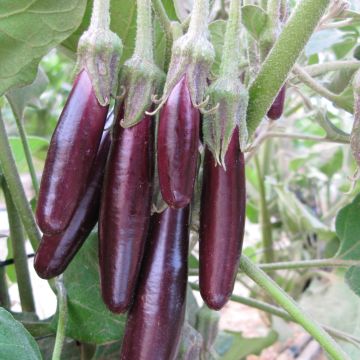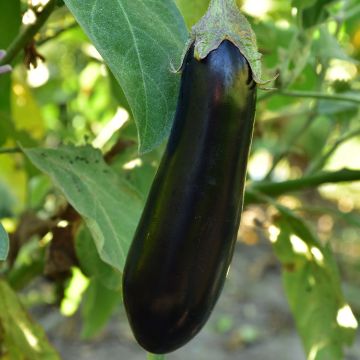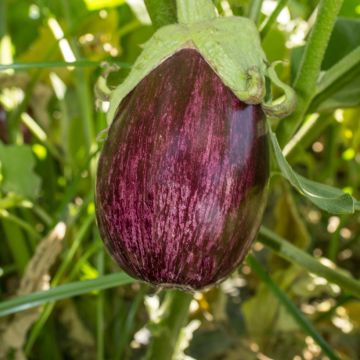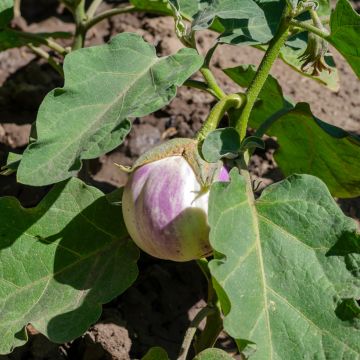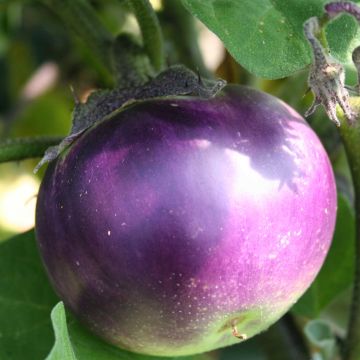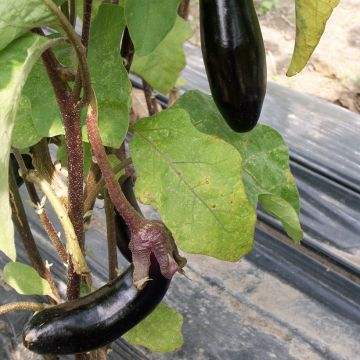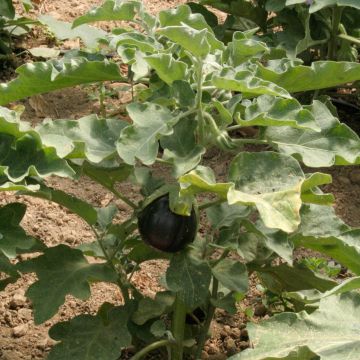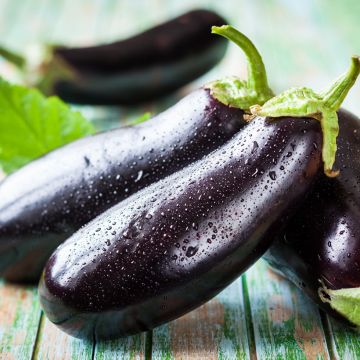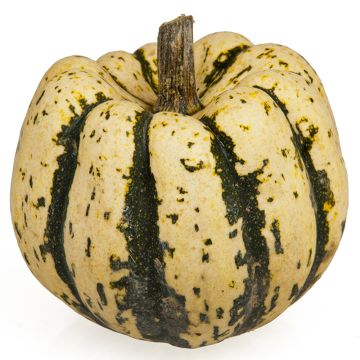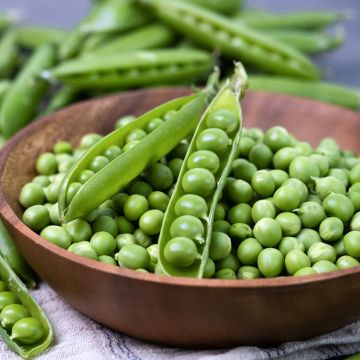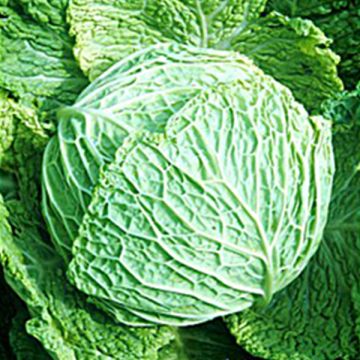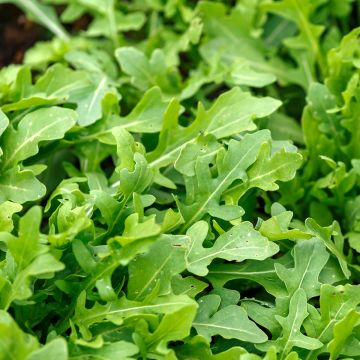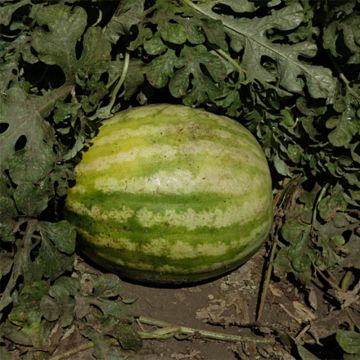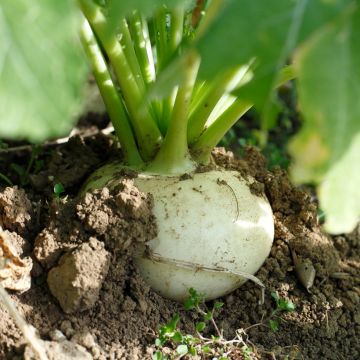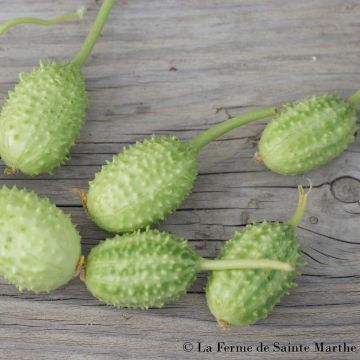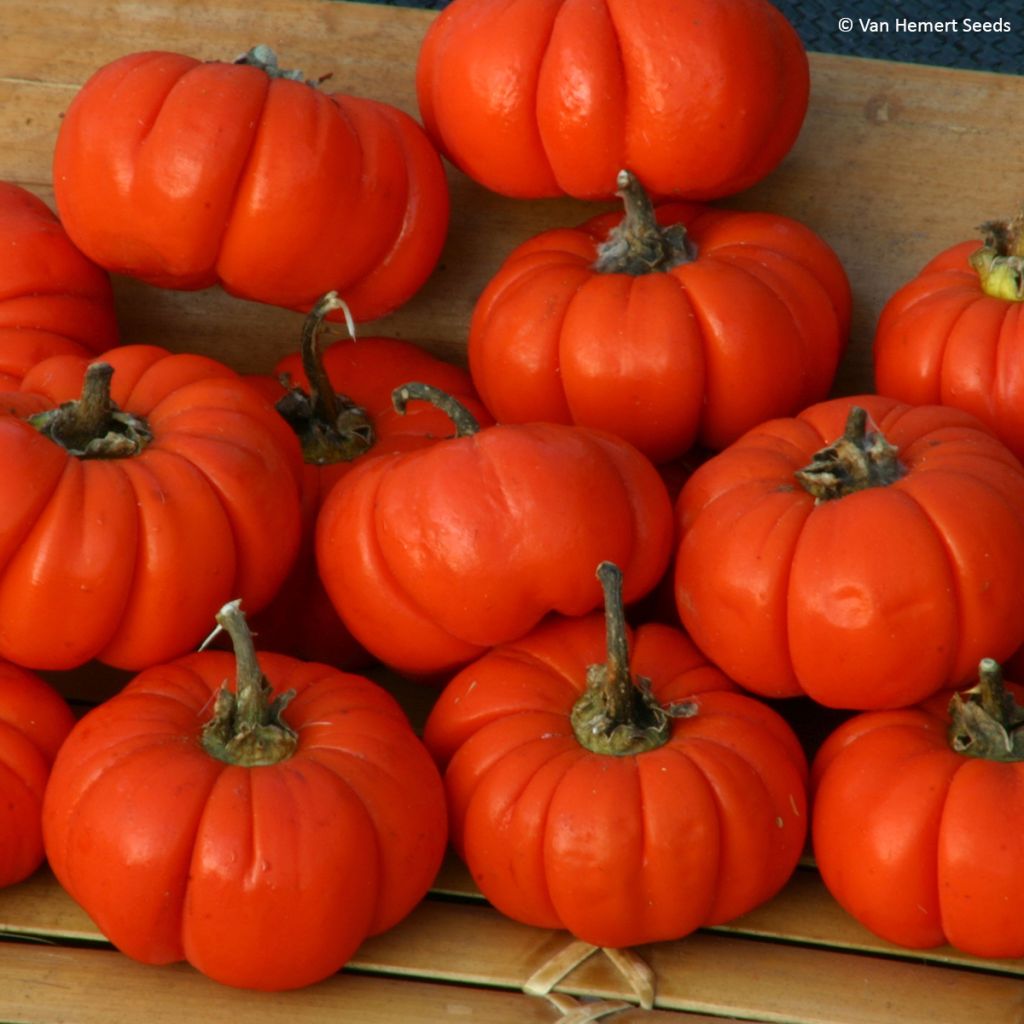

Solanum aethiopicum Gilo
Solanum aethiopicum Gilo
Solanum aethiopicum Gilo
Ethiopian eggplant, Mock tomato, Garden egg, Gilo, Scarlet eggplant, bitter tomato, pumpkinos
Home or relay delivery (depending on size and destination)
Schedule delivery date,
and select date in basket
This plant carries a 6 months recovery warranty
More information
We guarantee the quality of our plants for a full growing cycle, and will replace at our expense any plant that fails to recover under normal climatic and planting conditions.
Description
The African Eggplant or 'Gilo' is a very beautiful exotic eggplant species originating from the African continent. Unique in its dense vegetation that can reach a height of 1.50 m (5ft), it offers fruits with firm, crunchy, and juicy flesh that is best consumed before ripeness to appreciate their sweet and slightly bitter flavour. To optimise its production potential, 'Gilo' needs sunlight and warmth. It appreciates a rich, humus-bearing, deep, acidic to neutral soil, as well as regular watering. It is also appreciated as an ornamental and decorative plant thanks to its colourful fruits. It is sown from February to April in a warm environment and harvested from June to October.
The Solanum aethiopicum, more commonly known as African Eggplant or Gilo, is also called different names depending on the countries where it is cultivated: Jiló, Scarlet Eggplant, Ethiopian Eggplant, or Bitter Tomato. A close cousin of the eggplant classically grown in Europe, it belongs to the Solanaceae family, like tomato and bell pepper. Solanum aethiopicum is a domesticated plant, derived from the wild species Solanum anguivi. It is mainly cultivated in tropical Africa and South America, especially in Brazil. Relatively unknown in Europe, it can be found grown in the extreme south of France and Italy. The African eggplant is one of the main vegetables in humid tropical Africa.
The African Eggplant is a perennial herbaceous plant in tropical climates, cultivated as an annual in our latitudes. It develops as a bushy clump, well-branched, reaching a height of 1 to 1.50 m (3 to 5ft). The leaves, attached to the branches by a long petiole, measure from 10 to 30 cm (4 to 12in) long and 10 to 20 cm (4 to 8in) wide. They are green in colour, silky with slightly lobed edges. From June to August, inflorescences appear in very short cymes, grouping 5 to 12 flowers with a white corolla, sometimes pale violet, 1 to 2 cm (0 to 1in) in diameter, with yellow stamens in the centre. Pollinated by insects, each flower gives birth to a fleshy, globose, ovoid or fusiform fruit, 4 to 6 cm (2in) in diameter, 60 to 80 grams, more or less ribbed, with a smooth skin, green in colour, turning reddish-orange when ripe, containing numerous flat seeds.
It must be admitted that its fruit is very beautiful and pleasantly colours the vegetable garden. It also has many nutritional benefits. Low in calories like most vegetables, rich in water, it contains minerals such as potassium and manganese. It is also rich in vitamin C and K and antioxidants. African eggplant leaves have therapeutic properties (digestive and anti-inflammatory actions) and pharmacological properties (antibacterial, antifungal, and healing). Unlike the typical eggplant in Europe (Solanum melongena), the fruit can be consumed when fully ripe, with reddish hues. However, ripening brings a slightly unpleasant bitter flavor, so the fruit is generally consumed while still green.
Sensitive to cold, the African eggplant does not tolerate temperatures below 4°C (39.2°F). In Europe, it is cultivated in Mediterranean regions or in greenhouses.
In the kitchen: African eggplant can be consumed raw, as fresh fruits or cooked with meats or other vegetables. Highly appreciated in Senegal, African eggplant caviar is a specialty made with lemon and garlic. The leaves can also be eaten as leafy vegetables, similar to spinach. Caution, the stems and leaves contain solanine and should not be consumed raw.
Harvest: The harvest period extends from July to October and varies depending on the planting date. It takes 70 to 90 days after sowing. The fruits are picked as they reach their maximum size and are still immature. At this stage, they are green to orange, with a sweet and slightly bitter taste, as they become more acidic as they ripen. For better preservation, it is advisable to harvest the fruit with its peduncle.
Storage: African eggplant does not keep well as its water content is high. They can be stored for a few days in the vegetable drawer of your refrigerator. When exposed to air, mature fruits quickly deteriorate and do not keep for more than 2 or 3 days.
Gardening tip: By leaving the dried fruits on the plant, similar to gourds, they will become very decorative and last longer than any pumpkin.
Report an error about the product description
Harvest
Plant habit
Foliage
Botanical data
Solanum
aethiopicum
Gilo
Solanaceae
Ethiopian eggplant, Mock tomato, Garden egg, Gilo, Scarlet eggplant, bitter tomato, pumpkinos
Solanum gilo
Cultivar or hybrid
Annual
Other Eggplant seeds
View all →Planting and care
Soil preparation: African eggplant plants are easy to grow. Sunlight and heat are crucial for the success of this crop. However, they can tolerate any type of soil, although they prefer rich and well-draining soil. If the soil is too compact, you can add some sand to improve its texture. It takes about 80 to 100 days from sowing to the first flowering.
Hotbed sowing: From mid-February to late April, sow your seeds indoors or in heated greenhouses in trays at temperatures above 20°C (68°F). Germination is rapid between 20 and 35°C (68 and 95°F). Bury the seeds under 3 to 7 mm (<1in) of specialised seed compost, as they need darkness to germinate. Do not use compost at this stage, as it may burn the future roots. African eggplant plants grow very quickly: the seeds usually sprout in one to two weeks on average. When the plants have two true leaves, consider transplanting them into pots. Keep the plants sheltered and provide good ventilation to acclimatise them to outdoor conditions.
Transplanting into open ground: Once the risk of frost has passed, and when the plants are 15 to 20 cm (6 to 8in) tall, transplant them into the open ground. Choose the sunniest and warmest spots in your garden. The base of a south-facing wall is an ideal position. Loosen the soil and dig a hole at least 3 to 4 times the volume of the plant's root system. Add some well-decomposed compost at the bottom. Space them about 30 cm (12in) apart in rows and about 60 cm (24in) between rows. Place your plant in the hole, burying it up to the first leaves, then fill in the hole. Firm the soil, create a basin around the plant, and water generously. Be careful not to wet the leaves to protect your plants from fungal diseases.
Maintenance: Using mulch around the base of your plants helps retain moisture and reduces the need for weeding. African eggplant plants do not require a lot of watering, as their root system can reach deep to find available resources. Water thoroughly only in prolonged drought.
Seedlings
Care
Intended location
This item has not been reviewed yet - be the first to leave a review about it.
Similar products
Haven't found what you were looking for?
Hardiness is the lowest winter temperature a plant can endure without suffering serious damage or even dying. However, hardiness is affected by location (a sheltered area, such as a patio), protection (winter cover) and soil type (hardiness is improved by well-drained soil).

Photo Sharing Terms & Conditions
In order to encourage gardeners to interact and share their experiences, Promesse de fleurs offers various media enabling content to be uploaded onto its Site - in particular via the ‘Photo sharing’ module.
The User agrees to refrain from:
- Posting any content that is illegal, prejudicial, insulting, racist, inciteful to hatred, revisionist, contrary to public decency, that infringes on privacy or on the privacy rights of third parties, in particular the publicity rights of persons and goods, intellectual property rights, or the right to privacy.
- Submitting content on behalf of a third party;
- Impersonate the identity of a third party and/or publish any personal information about a third party;
In general, the User undertakes to refrain from any unethical behaviour.
All Content (in particular text, comments, files, images, photos, videos, creative works, etc.), which may be subject to property or intellectual property rights, image or other private rights, shall remain the property of the User, subject to the limited rights granted by the terms of the licence granted by Promesse de fleurs as stated below. Users are at liberty to publish or not to publish such Content on the Site, notably via the ‘Photo Sharing’ facility, and accept that this Content shall be made public and freely accessible, notably on the Internet.
Users further acknowledge, undertake to have ,and guarantee that they hold all necessary rights and permissions to publish such material on the Site, in particular with regard to the legislation in force pertaining to any privacy, property, intellectual property, image, or contractual rights, or rights of any other nature. By publishing such Content on the Site, Users acknowledge accepting full liability as publishers of the Content within the meaning of the law, and grant Promesse de fleurs, free of charge, an inclusive, worldwide licence for the said Content for the entire duration of its publication, including all reproduction, representation, up/downloading, displaying, performing, transmission, and storage rights.
Users also grant permission for their name to be linked to the Content and accept that this link may not always be made available.
By engaging in posting material, Users consent to their Content becoming automatically accessible on the Internet, in particular on other sites and/or blogs and/or web pages of the Promesse de fleurs site, including in particular social pages and the Promesse de fleurs catalogue.
Users may secure the removal of entrusted content free of charge by issuing a simple request via our contact form.
The flowering period indicated on our website applies to countries and regions located in USDA zone 8 (France, the United Kingdom, Ireland, the Netherlands, etc.)
It will vary according to where you live:
- In zones 9 to 10 (Italy, Spain, Greece, etc.), flowering will occur about 2 to 4 weeks earlier.
- In zones 6 to 7 (Germany, Poland, Slovenia, and lower mountainous regions), flowering will be delayed by 2 to 3 weeks.
- In zone 5 (Central Europe, Scandinavia), blooming will be delayed by 3 to 5 weeks.
In temperate climates, pruning of spring-flowering shrubs (forsythia, spireas, etc.) should be done just after flowering.
Pruning of summer-flowering shrubs (Indian Lilac, Perovskia, etc.) can be done in winter or spring.
In cold regions as well as with frost-sensitive plants, avoid pruning too early when severe frosts may still occur.
The planting period indicated on our website applies to countries and regions located in USDA zone 8 (France, United Kingdom, Ireland, Netherlands).
It will vary according to where you live:
- In Mediterranean zones (Marseille, Madrid, Milan, etc.), autumn and winter are the best planting periods.
- In continental zones (Strasbourg, Munich, Vienna, etc.), delay planting by 2 to 3 weeks in spring and bring it forward by 2 to 4 weeks in autumn.
- In mountainous regions (the Alps, Pyrenees, Carpathians, etc.), it is best to plant in late spring (May-June) or late summer (August-September).
The harvesting period indicated on our website applies to countries and regions in USDA zone 8 (France, England, Ireland, the Netherlands).
In colder areas (Scandinavia, Poland, Austria...) fruit and vegetable harvests are likely to be delayed by 3-4 weeks.
In warmer areas (Italy, Spain, Greece, etc.), harvesting will probably take place earlier, depending on weather conditions.
The sowing periods indicated on our website apply to countries and regions within USDA Zone 8 (France, UK, Ireland, Netherlands).
In colder areas (Scandinavia, Poland, Austria...), delay any outdoor sowing by 3-4 weeks, or sow under glass.
In warmer climes (Italy, Spain, Greece, etc.), bring outdoor sowing forward by a few weeks.



































